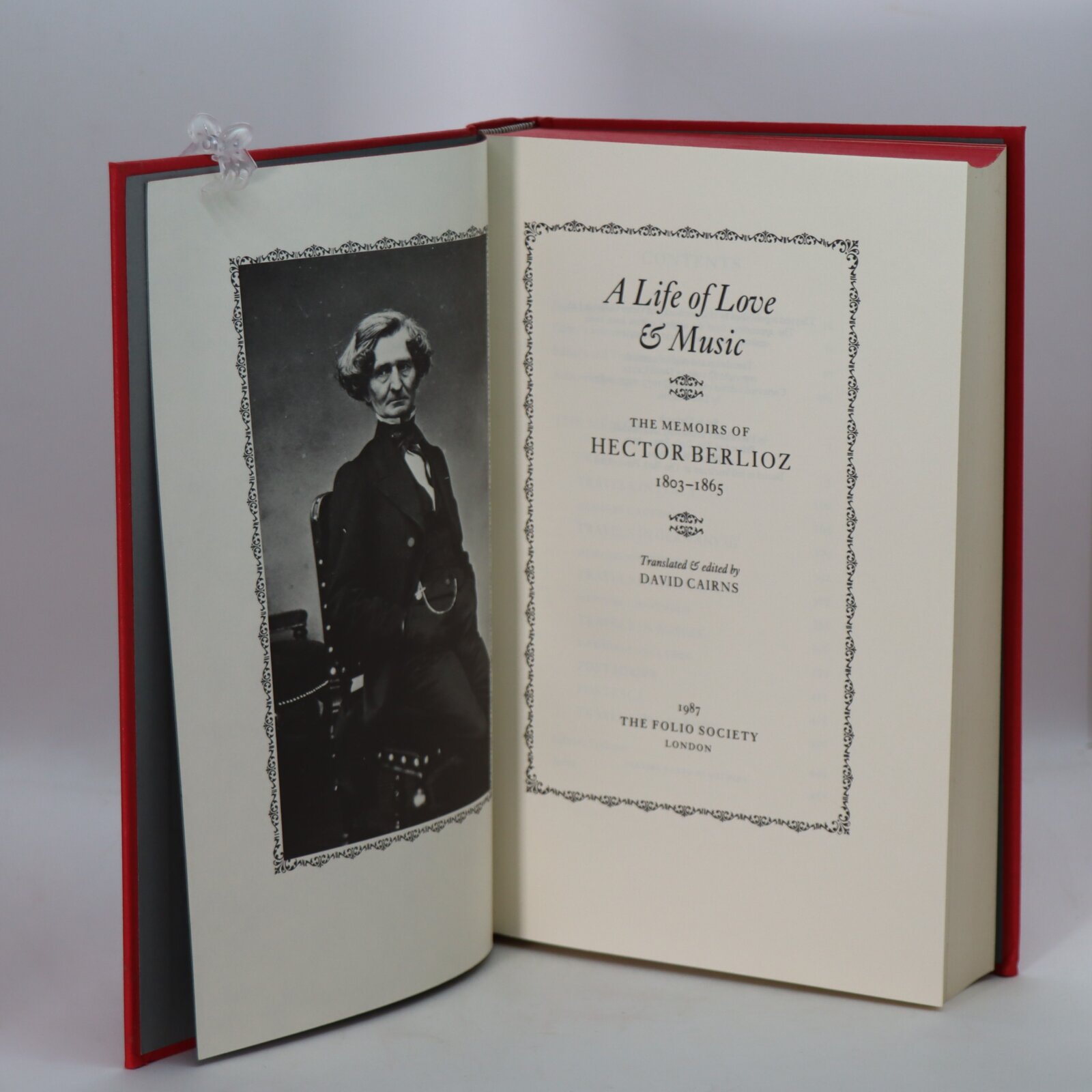A Life and Love of Music. Hector Berlioz.
ISBN: 9780393040623
Printed: 1987
Publisher: Folio Society. London
| Dimensions | 17 × 26 × 4 cm |
|---|---|
| Language |
Language: English
Size (cminches): 17 x 26 x 4
Condition: Fine (See explanation of ratings)
Your items
Item information
Description
in a fitted box. Red cloth binding with gilt face image on the front board. Black fiddle shaped title plate with gilt title on the spine.
Herein is an in-depth photographic presentation offered to stimulate your feel and touch. More traditional book descriptions are immediately available on request
Louis-Hector Berlioz (11 December 1803 – 8 March 1869) was a French Romantic composer and conductor. His output includes orchestral works such as the Symphonie fantastique and Harold in Italy, choral pieces including the Requiem and L’Enfance du Christ, his three operas Benvenuto Cellini, Les Troyens and Béatrice et Bénédict, and works of hybrid genres such as the “dramatic symphony” Roméo et Juliette and the “dramatic legend” La Damnation de Faust.
The elder son of a provincial doctor, Berlioz was expected to follow his father into medicine, and he attended a Parisian medical college before defying his family by taking up music as a profession. His independence of mind and refusal to follow traditional rules and formulas put him at odds with the conservative musical establishment of Paris. He briefly moderated his style sufficiently to win France’s premier music prize – the Prix de Rome – in 1830, but he learned little from the academics of the Paris Conservatoire. Opinion was divided for many years between those who thought him an original genius and those who viewed his music as lacking in form and coherence.
At the age of twenty-four Berlioz fell in love with the Irish Shakespearean actress Harriet Smithson, and he pursued her obsessively until she finally accepted him seven years later. Their marriage was happy at first but eventually foundered. Harriet inspired his first major success, the Symphonie fantastique, in which an idealised depiction of her occurs throughout.
Berlioz completed three operas, the first of which, Benvenuto Cellini, was an outright failure. The second, the huge epic Les Troyens (The Trojans), was so large in scale that it was never staged in its entirety during his lifetime. His last opera, Béatrice et Bénédict – based on Shakespeare’s comedy Much Ado About Nothing – was a success at its premiere but did not enter the regular operatic repertoire. Meeting only occasional success in France as a composer, Berlioz increasingly turned to conducting, in which he gained an international reputation. He was highly regarded in Germany, Britain and Russia both as a composer and as a conductor. To supplement his earnings he wrote musical journalism throughout much of his career; some of it has been preserved in book form, including his Treatise on Instrumentation (1844), which was influential in the 19th and 20th centuries. Berlioz died in Paris at the age of 65.
Berlioz’s literary output was considerable and mostly consists of music criticism. Some was collected and published in book form. His Treatise on Instrumentation (1834) began as a series of articles and remained a standard work on orchestration throughout the 19th century; when Richard Strauss was commissioned to revise it in 1905 he added new material but did not change Berlioz’s original text. The revised form remained widely used well into the 20th century; a new English translation was published in 1948.
Other selections from Berlioz’s press columns were published in Les Soirées de l’orchestre (Evenings with the Orchestra, 1852), Les Grotesques de la musique (1859) and À travers chants (Through Songs, 1862). His Mémoires were published posthumously in 1870. Macdonald comments that there are few facets of musical practice of the time untouched in Berlioz’s feuilletons. He professed to dislike writing his press pieces, and they undoubtedly took up time that he would have preferred to spend writing music. His excellence as a witty and perceptive critic may have worked to his disadvantage in another way: he became so well known to the French public in that capacity that his stature as a composer became correspondingly more difficult to establish.
Want to know more about this item?

Related products
Share this Page with a friend











